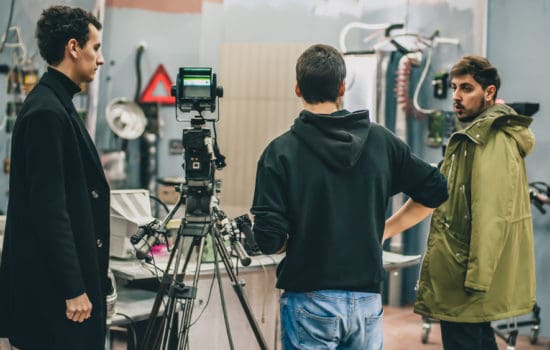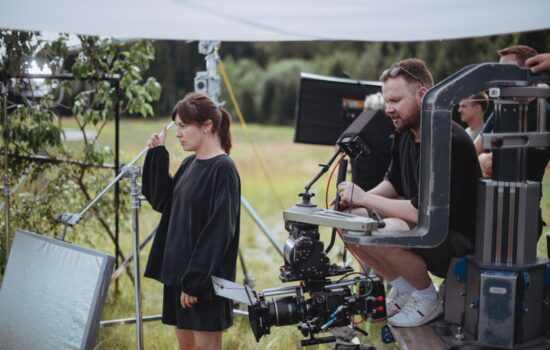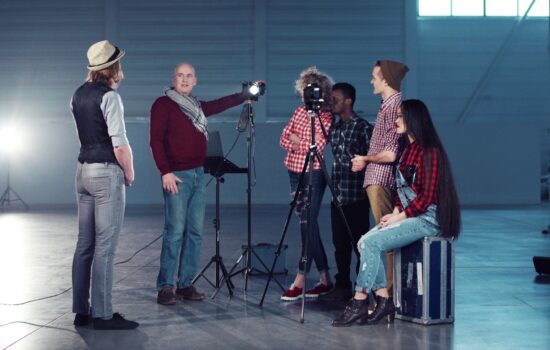Lead Chef
Career Overview
Lead Chefs in television, film and commercials feed the cast and crew breakfast and lunch on production days. As part of the catering team, they feed from 50 to 350 people at any given time.
Alternate Titles
Key Caterer, Catering, Chef Driver, Head Chef
Avg. Salary
$50,0001
Salary Range
$25K – $69K1

How To Become a Lead Chef
People also ask
Career Description
Eddie Eum is the Lead Chef at Bruce’s Gourmet Catering, a catering company that has fed cast and crew on leading shows including This Is Us, Big Little Lies, Scandal, American Horror Story and Modern Family.
He explains the setup for a catering team in the motion picture industry: “I am the Chef and Lead of my team. On production, I am actually labeled as a Chef Driver because I drive the catering truck! We work out of the truck itself and it is fully equipped with refrigeration and a full commercial kitchen. It’s a tight squeeze, but ours is a luxury compared even to some of the restaurants I’ve worked at.
“I’m lucky because Bruce’s Gourmet Catering provides us with really nice equipment. I also have a support vehicle, a box truck, which carries all our setup materials such as tables and chairs, catering setups, dishes, dispensers, you name it.”
Eum manages a team that breaks down as Lead Chef, Lead Cook (like a Sous Chef at a restaurant) and the Helpers. “We all have our stations and responsibilities and work in close sync to get the job done. Normally, we’re catering for well over one hundred people so we have to function together really well.”
On production days, breakfast tends to be served at 6 am and lunch at midday. For Eum and his team, that means arriving early: “We normally meet about an hour prior to service. The reality is, that’s not a long time to prepare over one hundred breakfasts, but we have such a well-oiled machine. We can have the whole breakfast set up in just sixty minutes — pop-ups, breakfast tables, a full buffet — it’s pretty incredible.”
Although the actual cooking is done on-site, Eum explains that much of the intricate preparatory work is done elsewhere: “A lot of our bulk prep — the fine cutting, the blanching, bulk cooking, meat marinading, fish gutting — we do that at a 40,000 square foot, state-of-the-art commissary where we have incredible equipment for bulk prepping.
“We might need to cook 40 lb. of pasta in one go because if we try and do it on location, we can only do small batches and it takes up too much time and, ultimately, sacrifices quality.” Eum says that it’s all about planning ahead: “We ‘re meticulously prepared so once we get on location or on stage, we concentrate on the actual cooking on the grills or the barbecues.
“We make sauces on the trucks and we have three commercial ovens for roasting vegetables and baked potatoes. In fact, not a lot of cooking is done ahead of time but the tedious prep work is already squared away.” Eum insists that successful catering is all about planning: “You have to think smartly and plan ahead. You can provide a great meal, layered with so many nuances and textures as long you plan it out well.”
It isn’t only the cooking and food prep that require careful planning, it’s the logistics of the job that require extra attention. Eum lists some of the questions they need to answer before driving out to a location: “Is there power at your location, do you have access to your ovens there? Sometimes we have to haul food a hundred yards because of some particular location-based set up so we have to be ready for that.
“I communicate with production by talking with the ADs (Assistant Directors) and Location Managers to understand what we’re up against the day before. For example, if we’re shooting on a farm, will we have access to the barbecues? You can’t assume you will, they might be a fire hazard — Production can throw you curves and loops on the day so you have to be sure you know what you’re dealing with.”
In terms of hiring practices, it’s usually the Line Producer or UPM (Unit Production Manager) who hires the Caterers, but sometimes a cast member or Executive Producer will request a specific chef or company.
“A lot of times Producers will have a working relationship with departments and their heads — they might work well with a particular Sound Department or Caterer and they want that well-oiled machine. It makes their job a lot easier when they bring in people they trust and people they’ve already worked with.”
Eum describes the specific joys of catering for film and television: “What’s great about production catering as opposed to restaurant cheffing is that you build relationships with cast and crew on a daily basis and I love that. You get to know everybody and it’s so rewarding when they come back to tell you how much they enjoyed their meal.”
Eum addresses the specific challenges of catering in Southern California: the weather. “When we’re working out in the Valley or in Santa Clarita in the middle of the summer and it’s 112º outside, it’s easily 120º inside the catering truck. And, unfortunately, it’s not an air-conditioned environment…but we make it happen!”
Another important factor is timing and being on time is paramount for any job in the industry. Eum recalls a time he missed the sign to basecamp and got his truck stuck on a dirt road: “A tractor had to come out with chains and haul us out! I was only twenty minutes late in the end, but it was a close shave. Turning up late is unacceptable and it still haunts me!”
What are the levels of Chefs?
To eventually attain the title of Lead Chef, you may need to first gain experience via more entry-level positions. In general, the Chef levels begin with Junior Chef then Station Chef then Deputy Chef and finally Head or Lead Chef.
Salary
$50,000 is the average annual salary for a Lead Chef in the film industry. The salary range for Lead Chefs runs from $25,000 to $69,000.
Caterers are paid through Production at the Teamster Local 399 hourly rate. Eum crunches the numbers: “A full-time Helper employee, assuming nine or ten months of work in a given year, will earn around $50,000. If you’re a union Chef working full-time, you should expect $100,000 and above. If you’re a day-player in the union, not working full-time, you can still bring in $55,000 to $70,000 per year, just working two or three days a week.”
Hey, what do you think about trying our new Film Career HelperFilm Career Helper really quick? It’s totally free and could help get your career moving fast! Give it a try. It’s totally free and you have nothing to lose.
Career Outlook
Eum confesses that any job can be a grind, especially hospitality jobs when you’re working weekends and holidays. However, Eum points out that catering in the production world has actually provided him with a very high quality of life:
“Motion picture schedules are, on the whole, a Monday-Friday affair. I wouldn’t want to go back into the restaurant business because, besides my long hours, it’s actually the first time I’ve been able to see my family grow up and spend quality time with them on the weekends. In that way, it’s different from a hotel or restaurant gig.”
For Eum, maintaining a balance means surviving and flourishing with less sleep: “I have two kids so it’s not about me anymore — instead of eight hours sleep, I function on five or six so I can take my little ones to the park, drive them to gymnastics, whatever it may be. That’s happiness for me.”
What is the highest-ranking Chef called?
The highest-ranking Chef on a production is called a Lead Chef or Head Chef.
Career Path
Eum always wanted to be a Cook and was a natural at heart: “At middle school, I would hover around my mom, trying to help out and learn. I’d start out by making simple meals like fried rice then, by my freshman year in high school, I was preparing full Thanksgiving meals for twenty people. It came naturally to me, I enjoyed it. By my sophomore year at high school, I knew I wanted to be a Chef.”
“I’ve had young people shadow me a lot, and I have even put job postings at my alma mater,” says Eum. “It’s a haul from Orange County to get to Hollywood or the Valley, but some people are really committed!”
At Bruce’s Gourmet Catering specifically, Eum will screen candidates before sending potential Chefs to a second interview with their Executive Chef: “This is why I encourage anyone to make sure their fundamental culinary skills are up to scratch before they even think about entering motion picture catering.”
There is nothing to stop young people from contacting the Lead Chefs in any catering outfit to see if they will be allowed to come in and observe. Get on IMBD Pro, check the Catering Teams on the leading productions and get in touch with them. Most people are very receptive to eager people looking to break into this world.
- Practice your skills, even if you’re not at culinary school. You’ll need to work efficiently under intense time constraints.
- See if there’s a way to shadow a Caterer for a day in production. Even better, get permission from the union to start building your statutory hours.
What is the lowest Chef position?
On a film set, someone wanting to work their way up to Lead Chef might first begin as a Junior Chef. In many cases, though, having a crew of more than one Chef is reserved for substantially large productions.
Experience & Skills
Eum is crystal clear about the skills that you should hone before you step into the industry: “Establish a firm foundation in terms of your culinary skills. Apply for an entry-level position in any good restaurant or hotel and that will start you off with the basics.
“It doesn’t matter if you’ve had a $50,000 per year education or went to an accredited program or even have no experience at all, you start off as a Prep Cook. You learn to peel a potato, a carrot, trim meats, debone a chicken, work on fish, mince garlic. You learn classical sauce foundations and roux, etc. I wouldn’t necessarily start in catering — it’s a good idea to learn your foundational skills in an established restaurant environment.”
It turns out that it isn’t just the skills themselves you need to master, it’s about doing it all efficiently: “I’m sure everyone knows how to peel a carrot, but can you do it efficiently? There are a lot of so-called foodies and cooks out there, but once they step into a high-volume, high-pressure commercial environment, there are certain ways of doing things efficiently that they don’t know about.”
Eum shares that most Chefs don’t even know that catering in the motion picture industry is even an option: “When I tell other Chefs what I do, they say, ‘I didn’t know such a thing even existed!’ When I started, I actually had a recruiter helping me look for a job placement and I was bowled over by the whole opportunity and now I’ve been doing it for twelve years.”
Eum boils the successful personalities in this field down to those who have that extra passion for food: “Whether you’re cooking in a restaurant or hotel, or catering for television and film, you need to have that desire — it’s long hours, 10-16 hour days so it’s not that Banker nine-to-five job. When you’re getting up at 1 am, you need the will and drive to push through.”
That desire also applies to how you react under pressure. As Eum illustrates, “When Production comes up to you and asks you to do something, no matter how limiting or difficult it may be, you have to dig deep, look your crew in the eye and say, ‘Alright, they want to eat one hour early today and we’re going to make this happen.’
“The best thing is when a Producer comes back and thanks you for making the change — it might be the difference of making a shot, or not accruing financial, union penalties for not feeding people on time. That can add up to thousands and thousands of dollars. Under pressure, you need to stay cool and collected.”
Education & Training
Eum attended culinary school at Orange Coast College which is accredited by the American Culinary Federation.
He explains, “They’re the largest governing body of Chefs and they host food shows, competitions and do a lot of higher education reach-out. If you ever see someone hailing themselves as a ‘Certified Executive Chef’ or ‘Certified Pastry Chef’ or ‘Certified Master Chef,’ those are all accreditations from that organization — it’s held in very high esteem.”
Eum is proud that his college has one of the best hot food teams in the nation, evidence of the competitive spirit in the cheffing space: “We had a team of students doing tryouts and tests and we pushed ourselves — we competed at state, regional and even national level competitions and tryouts. It was pretty amazing.”
All in all, Eum recommends culinary school if it is something within your budget. If not, you can work your way up the restaurant kitchen ladder with hard work and by listening and watching attentively. Practice whenever you can and, above all, make sure cooking is something that drives you.
Says Eum, “It’s all about passion. Aside from any qualifications or education, you need that desire to drive you forward.”
Additional Resources
Caterers fall under the remit of the Teamsters Local 399, the reason being they drive a catering truck which is regarded as a specialty vehicle. Eum describes the rules you need to adhere to before joining: “You go to the local union and give them a letter of intent. From there, your obligation is to rack up a certain amount of hours under permit, like a probationary period, and then you can join the union.”
FAQ
What is the single biggest suggestion you would give to someone wanting to get into this career?
“To be a Caterer, you need a solid foundation in classical cooking. You see a lot of restaurant Chefs who are able to transition well to catering, but it’s not simple. You have to serve huge amounts of people at one time, say, 300 people within forty-five minutes. You need to be ready to adapt and it’s crucial to be confident in your basics.”
What’s the #1 mistake people make when trying to get into this career?
“I always tell new people that they should never assume anything. It’s always better to ask whether it be logistics-related, or cooking-related. It might be something as simple or mundane as the best way to open a can without cutting your knuckles open, but it’s always better to ask!”
If you could describe in one word what makes you successful, what would it be?
“Desire. In retrospect, I learned a lot from my mistakes but I always had that love and drive to make it work.”
Sources

Edward Eum
Edward Eum has catered for countless network shows such as Grey’s Anatomy, The Catch, Station 19, Gang Related, Bones and Private Practice. He studied at Orange Coast College before progressing to an Executive Chef position in the Renaissance Hotel Group.
He then spent six years as an Executive Chef at the P.F. Chang Group and went on to work for Roy Yamaguchi’s Hawaiian restaurants in Downtown Los Angeles. He has a three-year-old and a five-year-old and doesn’t sleep as much as he used to.
References
- 1. "Lead Chef Salaries in United States". Glassdoor.com. published: February 20, 2017. retrieved on: December 14, 2019



















